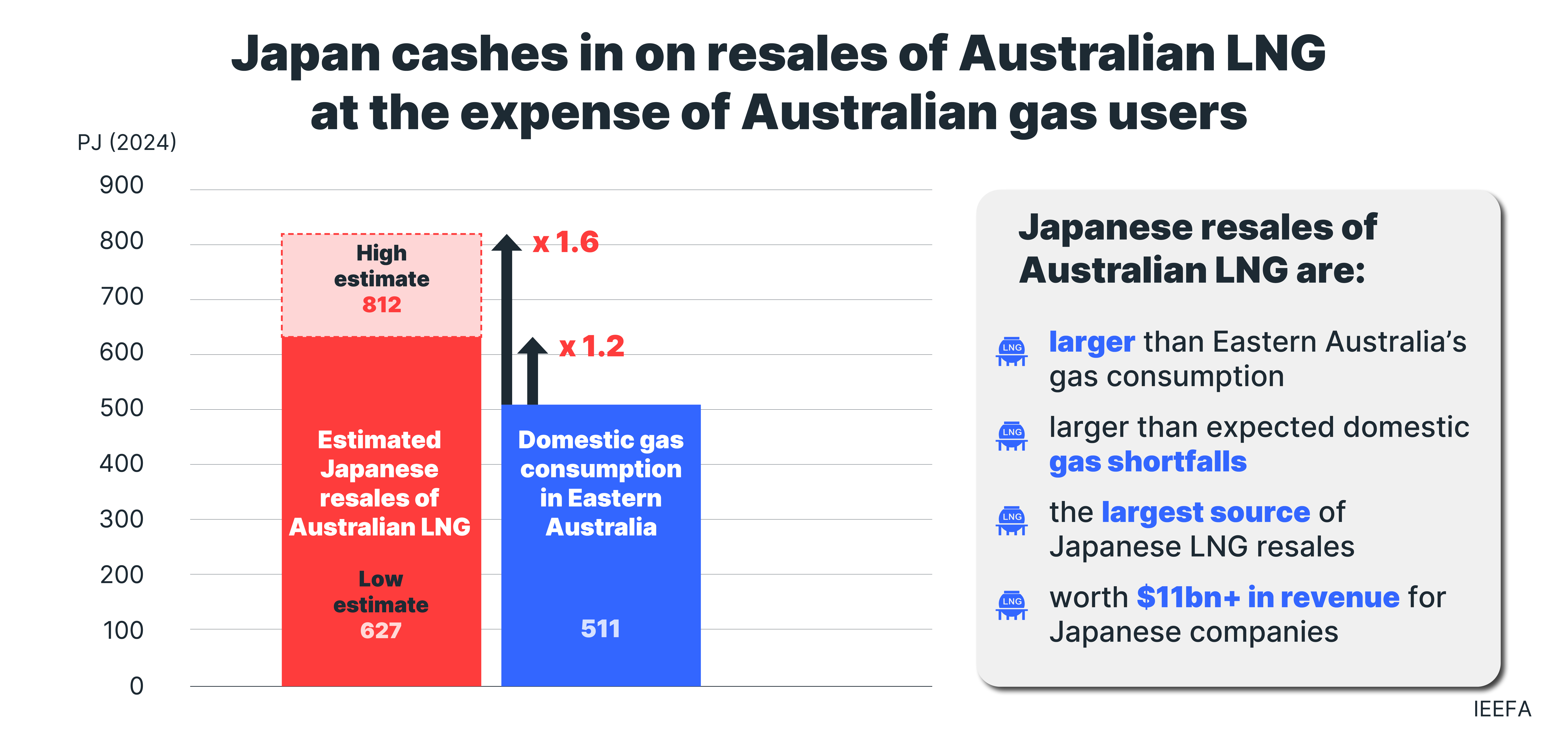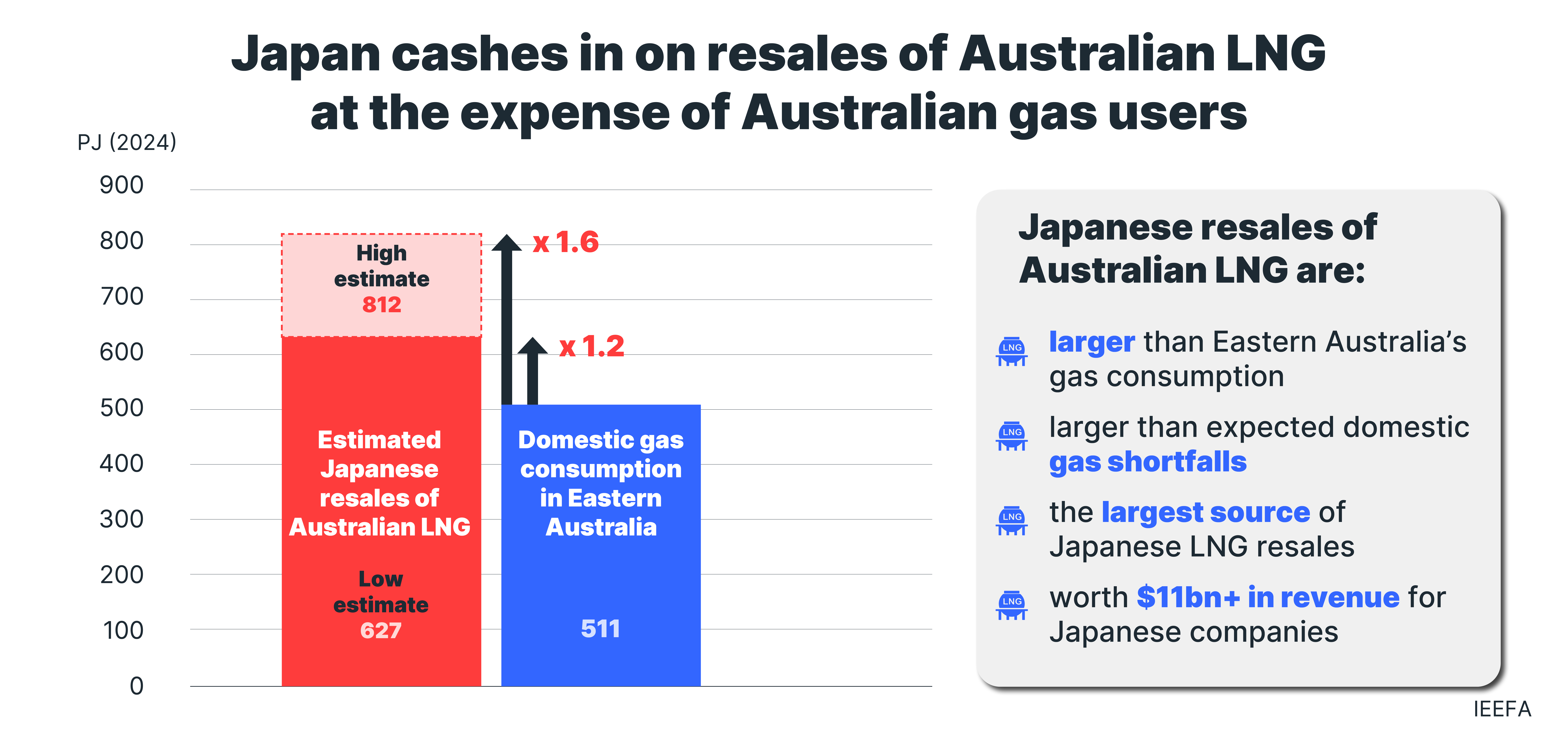Churn and earn: How Japan cashes in on resales of Australian LNG at local gas users’ expense

Key Takeaways:
Japan onsold at least 600 petajoules (PJ) of Australian LNG to overseas markets, and potentially 800PJ, in 2024, more than Eastern Australia's annual domestic gas consumption.
In 2024, Australia was the largest source of Japanese-chartered LNG shipments sold to third countries, supplying 41% of cargos.
Japanese resales of LNG from both Eastern and Western Australia are larger than the projected annual gas shortfalls in those regions in the coming years.
Japanese resales are likely driving more than AU$1 billion in profits for Japanese companies, raising questions about Japan's interests in Australia's energy policies.
20 May 2025 (IEEFA Australia): As both Eastern and Western Australia face gas shortfalls, Japan is onselling vast volumes of Australian LNG at a handsome profit, according to research released today.
In-depth analysis of LNG shipment and contract data shows Japanese companies are lucratively onselling about half as much as they import from Australia, as revealed in the briefing note, How Japan cashes in on resales of Australian LNG at the expense of Australian gas users.
Last year alone, Japan onsold an estimated 600-800 petajoules (PJ) of Australian LNG to other countries, say the authors Amandine Denis-Ryan and Josh Runciman.
“In total, we estimate Japanese resales of Australian LNG likely amount to at least 11.3 million tonnes (Mt) and up to 14.7Mt,” says Ms Denis-Ryan, chief executive of IEEFA Australia.
“In petajoules, this means Japanese resales of Australian LNG likely amount to at least 627PJ and up to 812PJ, or 1.2-1.6 times Eastern Australia’s total domestic gas consumption.”

Australia appears to be the largest source of LNG onsold by Japan, representing 41% of Japanese-chartered shipments sold to third countries last year, followed by the US.
Within Australia, the largest sources are Western Australia, followed by the Northern Territory then Queensland. In both Eastern and Western Australia, Japanese resales volumes are larger than the projected annual gas shortfalls in coming years.
“It is quite extraordinary that Australia is now facing gas shortfalls on both sides of the country, even considering importing LNG, while Japan resells enormous volumes of our gas overseas for a profit,” Ms Denis-Ryan says.
With Japan’s domestic gas use steadily declining, LNG importers there have discovered a lucrative side hustle in this third-party trade. Last year alone, IEEFA estimates Japanese companies resold AU$11 billion to AU$14 billion of Australian LNG with profits likely exceeding AU$1 billion.
“With such a large volume of Australian LNG being purchased and resold by Japan, the profit on those resales is likely a key driver for Japan’s interest in the Australian energy market,” says Mr Runciman, IEEFA’s lead analyst, Australian gas.
“This is evidenced by the fact that the total volume of Australian LNG shipments going to Japan (26.4Mt) equals the total volume of contracts (26.6Mt), showing resales are not due to contract surpluses.”
More than two-thirds of the resold LNG ends up in Taiwan and South Korea, high value markets for Australian gas producers.
“This should be concerning for Australian producers, for whom these are premium markets with high purchasing power and low credit risk,” Ms Denis-Ryan says.
“Based on Australian government estimates of market value in 2023, Taiwan and South Korea present the highest value of Australia’s major LNG markets at AU$979 and AU$1,086 per tonne of LNG respectively compared with an average export value of AU$921 per tonne.”
Citing energy security concerns, Japan has opposed any moves by Australia to rein in LNG exports, lest “the neon lights of Tokyo” go out.
In Canberra, however, this should be a lightbulb moment as the federal government grapples with reserving gas supply for domestic use.
* Note: For a full explanation of the methodologies used in this analysis, please refer to the briefing note below.
Read the report: How Japan cashes in on resales of Australian LNG at the expense of Australian gas users
Media contact: Amy Leiper, ph 0414 643 446, [email protected]
Author contact: Amandine Denis-Ryan, [email protected]
About IEEFA: The Institute for Energy Economics and Financial Analysis (IEEFA) examines issues related to energy markets, trends and policies. The Institute’s mission is to accelerate the transition to a diverse, sustainable and profitable energy economy. (ieefa.org)














